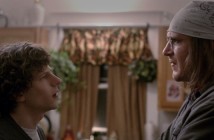
Cast: Bogdan Dumitrache, Diana Avrămuţ, Mihaela Sîrbu
Director: Corneliu Porumboiu
Country: Romania | France
Genre: Drama
Official Trailer: Here
Editor’s Notes: The following review is reprinted from our coverage of the Film Society of Lincoln Center’s Making Waves Romanian Film Festival. When Evening Falls on Bucharest or Metabolism opens in limited release from Friday, January 9th.
“When filming, you put what interests you in the centre, not on the margin.” So says a doctor surveying the endoscopy DVD of a deathly serious director whose alleged illness is nought more than one part of a ploy to rehearse in-depth and out of clothes with an attractive actress. Corneliu Porumboiu has always put what interests him in the centre: here in When Evening Falls on Bucharest or Metabolism, that’s cinema itself, via a self-referential movie that’s at much about formalism as it is characterised by it. Indeed the film’s opening shot, one of its impressively few seventeen, sees this director, Paul, framed in silhouette as he drives through the night expounding theories of the limitations of celluloid. It’s not only for the windshield that we can see he’s looking at the world through a screen.
Corneliu Porumboiu has always put what interests him in the centre: here in When Evening Falls on Bucharest or Metabolism, that’s cinema itself, via a self-referential movie that’s at much about formalism as it is characterised by it.
 Ditto Porumboiu, whose movies have rendered cinematic the pain of the past and the difficulty in defining oneself against the wider world, using film as a tool to forge futures both personal and political. It’s little surprise, given how much of his function to date has been consigned to form, that he should come to address that form directly. The conversations that unfold across this bare narrative address the ideas of a cinema—and thus a world viewed through it—that’s changing under the auspices of digital technology. “Movies will be something else,” says Paul of the future; like a purist persisting in the notion that “film” ought not to refer to anything other than its celluloid namesake, he clings to convention as though afraid of falling if he dares let go.
Ditto Porumboiu, whose movies have rendered cinematic the pain of the past and the difficulty in defining oneself against the wider world, using film as a tool to forge futures both personal and political. It’s little surprise, given how much of his function to date has been consigned to form, that he should come to address that form directly. The conversations that unfold across this bare narrative address the ideas of a cinema—and thus a world viewed through it—that’s changing under the auspices of digital technology. “Movies will be something else,” says Paul of the future; like a purist persisting in the notion that “film” ought not to refer to anything other than its celluloid namesake, he clings to convention as though afraid of falling if he dares let go.
“I’ve been formed by this limit,” he says in the opening scene, explaining how the shot length celluloid imposes encourages the kind of exhaustive planning he implements, and which Porumboiu implements too. The links between the directors are many; much as Paul may be lampooned for his aesthetic elitism, there’s a certain sympathy evident in his characterisation. If not aligning himself precisely with his protagonist—he more often feels like an image of the director his detractors might design—Porumboiu at least understands him and his essential struggle. He’s not unlike Police, Adjective’s Cristi, in a way: defined by his conviction, compelled to follow his heart, and yet fraught by fears of his own inability to address the imbalance between his vision of the world and reality.
There’s a scene where Paul extols the importance of emoting by implication in the simplest of gestures that culminates in the aggressive application of a lint roller; it’s at once emblematic of Porumboiu’s delectably dry humour and a strangely sad sign of just how entrenched these characters each are in their own way of envisioning existence through images, to the exclusion of the other’s.
 That’s a trouble attested above all in his conflation of actress and role: his obsession with first-timer Alina, ostensibly an effort to build character, is the crux of the film, both in its entanglement of process and product and the way it evidences his sense of cinematic superiority. There’s a scene where Paul extols the importance of emoting by implication in the simplest of gestures that culminates in the aggressive application of a lint roller; it’s at once emblematic of Porumboiu’s delectably dry humour and a strangely sad sign of just how entrenched these characters each are in their own way of envisioning existence through images, to the exclusion of the other’s. As Maria Raducanu sings in the song from which the film takes its title, or at least the former half: “I’m looking at you but I can see that you’re not”.
That’s a trouble attested above all in his conflation of actress and role: his obsession with first-timer Alina, ostensibly an effort to build character, is the crux of the film, both in its entanglement of process and product and the way it evidences his sense of cinematic superiority. There’s a scene where Paul extols the importance of emoting by implication in the simplest of gestures that culminates in the aggressive application of a lint roller; it’s at once emblematic of Porumboiu’s delectably dry humour and a strangely sad sign of just how entrenched these characters each are in their own way of envisioning existence through images, to the exclusion of the other’s. As Maria Raducanu sings in the song from which the film takes its title, or at least the former half: “I’m looking at you but I can see that you’re not”.
“A way of seeing, or rather of thinking, the world” is how Paul describes his relationship to cinema, and it’s evident that that’s indicative of Porumboiu’s too. His films have always been methodical, planned to perfection, defined by discursive dialogue, and yet immeasurably incisive for it all; his is a cinema that, by thinking it through, comes to see the world in striking new ways. In When Evening Falls on Bucharest or Metabolism he identifies, if not precisely with his protagonist, then with the problems that plague him: it would be imprudent to claim the endoscopy that provides the penultimate shot of the film is evidence of the director leaning excessively insular, and yet that’s precisely the point, in a peculiar way. In the past, Porumboiu’s comedy has lent a whole country catharsis. Here, the purview’s purely personal: the title’s latter half, to deploy the definitions in which this director so delights, might mean to throw away. If 12:08 East of Bucharest and Police, Adjective were Porumboiu seeking Romania’s future by surveying its past, Metabolism is him doing the same for himself.
When Evening Falls on Bucharest or Metabolism is a director leaning excessively insular, and yet that’s precisely the point, in a peculiar way.



